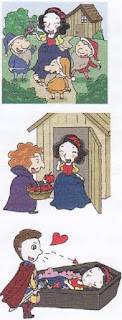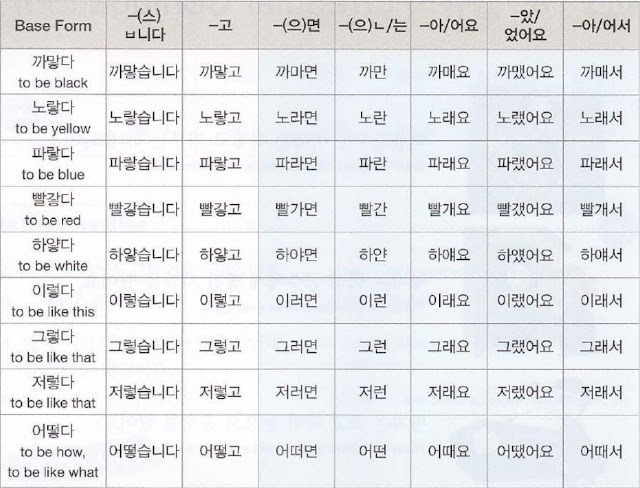 백설공주는 머리는 까맣고 피부는 하얘요.
백설공주는 머리는 까맣고 피부는 하얘요.
Snow White has black hair and a white complexion.
왕비는 백설 공주에게 빨간 사과를 줬어요.
The queen gave Snow White a red apple.
왕자는 크고 파란 눈으로 공주를 봤어요.
The prince looked at Snow White with his big blue eyes.
Grammar Focus:
When an adjective stem ending in ㅎ is added to an ending that begins with a vowel, ㅎ is omitted.
1. When endings beginning in vowels other than -아/어 are added to adjective stems ending in ㅎ, ㅎ is omitted.
 2. When endings beginning in -아/어 are added to adjective stems ending in ㅎ, ㅎ is omitted, and ㅣ is added.
2. When endings beginning in -아/어 are added to adjective stems ending in ㅎ, ㅎ is omitted, and ㅣ is added.

 Although the stems of 좋다 (to be good), 많다 (many), 낳다 (to bear, to give birth to), and 넣다 (to put in, to insert), etc. end in ㅎ they are conjugated regularly.
Although the stems of 좋다 (to be good), 많다 (many), 낳다 (to bear, to give birth to), and 넣다 (to put in, to insert), etc. end in ㅎ they are conjugated regularly.
 Conversation:
Conversation:
A: 보세요! 가을 하늘이 정말 파래요.
Look! The autumn sky is really blue.
B: 하늘은 파랗고 구름은 하얘서 그림 같아요.
The sky is blue, and the clouds are white, just like a painting.
A: 얼굴이 많이 까매졌네요.
Your face has tanned really brown (black).
B: 휴가 때 바다에 갔다 와서 그래요.
That’s because I went to the beach during vacation.
A: 파란 티셔츠 입은 남자가 누군지 아세요?
Do you know who that boy wearing the blue T-shirt is?
B: 네, 제 동생이에요. 관심 있어요?
Yes, that’s my little brother. Are you interested in him?
When the stems of 이렇다, 그렇다, 저렇다, and 어떻다 are added to endings that begin with -아/어, they conjugate to 이래, 그래, 저래 and 어때 instead of 이레, 그레, 저레 and 어떼.
• 날씨가 어떼요? (X)
->날씨가 어때요? (〇)
How is the weather?
• 에릭 씨는 안 간다고 그렜어요. (X)
->에릭 씨는 안 간다고 그랬어요. (〇)
Eric said to me, “I’m not going.”
>> Full of ‘Korean grammar in use – Beginner’: Click here
>> Fanpage: Say Hi Korean
